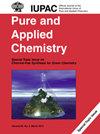Peptides for therapeutic applications – challenges and chances
IF 2
4区 化学
Q3 CHEMISTRY, MULTIDISCIPLINARY
引用次数: 0
Abstract
Peptides have beneficial properties for therapeutic applications due to their excellent target specificity, high affinity and activity, low toxicity and predictable metabolism. Thus, they became an important tool for research and medical purpose. However, peptides are fragile molecules, therefore, in order to be used as therapeutic agents they need to be stabilised by non-peptidic modifications. Required improvements of these peptide properties include longer half-life, higher bioavailability, increased potency and efficiency. Strategies to achieve these goals have been identified in the last years, with synthetic strategies to obtain sufficient amounts becoming increasingly important. In this review, peptides are discussed with respect to their therapeutic applications. Examples from glucagon-like peptide 1 receptor agonists are shown. Peptides are compared to small molecules and antibodies with respect to advantages and disadvantages in therapeutic applications.用于治疗的多肽--挑战与机遇
肽具有极佳的靶向特异性、高亲和力和高活性、低毒性和可预测的新陈代谢,因此在治疗应用方面具有优势。因此,多肽成为研究和医疗的重要工具。然而,肽是一种脆弱的分子,因此,要将其用作治疗剂,就需要通过非肽修饰使其稳定。这些肽特性所需的改进包括延长半衰期、提高生物利用度、增加药效和效率。近年来,实现这些目标的策略已经确定,而获得足够数量的合成策略也变得越来越重要。在本综述中,将讨论肽的治疗应用。文中举例说明了胰高血糖素样肽 1 受体激动剂。还比较了肽与小分子和抗体在治疗应用中的优缺点。
本文章由计算机程序翻译,如有差异,请以英文原文为准。
求助全文
约1分钟内获得全文
求助全文
来源期刊

Pure and Applied Chemistry
化学-化学综合
CiteScore
4.00
自引率
0.00%
发文量
60
审稿时长
3-8 weeks
期刊介绍:
Pure and Applied Chemistry is the official monthly Journal of IUPAC, with responsibility for publishing works arising from those international scientific events and projects that are sponsored and undertaken by the Union. The policy is to publish highly topical and credible works at the forefront of all aspects of pure and applied chemistry, and the attendant goal is to promote widespread acceptance of the Journal as an authoritative and indispensable holding in academic and institutional libraries.
 求助内容:
求助内容: 应助结果提醒方式:
应助结果提醒方式:


